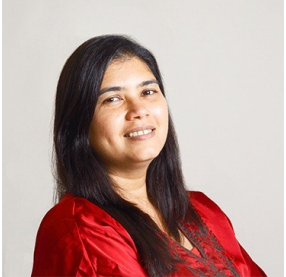An India CSR Leadership interview of ElsaMarie D’Silva, the Founder of Red Dot Foundation and President of Red Dot Foundation Global.
By Rusen Kumar
Red Dot Foundation and The Consulate General of Ireland, Mumbai are hosting a Data Challenge on Women’s Safety. The project will connect students across India and Ireland and has been developed with support from Education in Ireland. The aim of this Data Challenge on Women’s Safety is to provide an opportunity for students to get a deeper understanding of issues of sexual and gender-based violence through data analysis and visualizations, and even recommend ideas and possible solutions.
Due to widespread taboo and lack of awareness, this type of violence in particular often remains hidden from society. The Data Challenge seeks to break the silence on the issue and inspire students to take action. Red Foundation’s Safecity dataset comprising anonymous incidents of sexual and gender-based violence will form the base for the challenge.
In an exclusive interview, Rusen Kumar, Editor, India CSR speaks with ElsaMarie D’Silva, the Founder of Red Dot Foundation (India) and President of Red Dot Foundation Global to shed more light on this initiative taken by the organisation.
Tell us about your idea of building Red Dot Foundation’s (Safecity) platform.
The Safecity platform was launched in December 2012 as an immediate response to the gang rape of Jyoti Singh on a bus in Delhi. The aim was to make the issue of sexual and gender-based violence more visible by encouraging anonymous documentation of personal incidents which otherwise go unreported. With Safecity we are bridging the data gap that currently exists. One can read the reports, zoom in to see the incidents at the street/neighborhood level and analyse patterns and trends so as to design interventions for safety. Using evidence-based data, which is available to all citizens in an open-source format, one can improve one’s situational awareness, get community support and work with institutional stakeholders like the police to address sexual and gender-based violence. In my experience, not many people fully understand the implications of unconscious bias and harmful gender stereotypes, the spectrum of abuse and violence, the various legislations in India that protect women’s rights and their own agency to take action within the boundaries of the law. Our platform not only helps to break the silence on the issue but encourages everyone to use the data to inform themselves and design interventions in partnership with their community. After all, sexual and gender-based violence is not a woman’s issue alone but a societal one.
How does Safecity empower to create safer spaces?
Over the last nine years, we have collected thousands of stories that have provided great insights into the context in which violence takes place. We work with the local community NGOs, residents of cities and youth on college campuses to use the data to initiate community-based actions to educate, advocate and strengthen responses to sexual and gender-based violence. For example, the data can be used as a starting point for dialogue within the community on unconscious bias and harmful gender stereotypes that perpetuate this violence or they can invest in bystander training so that more people are equipped with skills on how to respond to different incidents. We also share the data with some police forces which adds to their decision-making capability and helps build trust between them and the community. We are working with Education officers in the District of Satara to prevent child sexual abuse. In many instances, we also use creative forms like wall murals, street theatre, design and data challenges like this one to engage people to understand the spectrum of abuse, know their rights and motivate them to take action to end sexual and gender-based violence.
What are the top initiatives according to you by Safecity?
Apart from our Safecity crowd map, our top initiatives are engaging youth to be peer educators to prevent sexual and gender-based violence and be active citizens to prevent it. This Data visualisation challenge is one such program that provides youth with the opportunity to experiment, understand the issue better using evidence-based data and work with peers to find solutions. Our aim is to provide knowledge, skills and tools for youth to stand up to violence, know their rights and feel confident in taking action. These skills will hold them in good stead in the future even in their professional life but more importantly, we hope they will not be perpetrators of the violence but active bystanders to prevent it.
Kindly highlight more on your partnership with the Consulate General of Ireland, Mumbai and what do you expect from Indian and Irish students.
We are excited to partner with the Consulate General of Ireland, Mumbai on this data challenge. Sexual and gender-based violence is a global pandemic impacting one in three women around the world at least once in their lifetime. Reporting of these incidents is extremely low not only in India but all around the world. By bringing youth from Ireland and India together to work on this data visualisation challenge we hope they will exchange ideas, get a deeper understanding of the issue and learn intercultural sensitivity. We hope the exchange of ideas might spark some out-of-the-box thinking and brainstorm for solutions that might work to address sexual and gender-based violence. “Learning by doing” is a very powerful way to engage young people in taking a stand and creating social impact.
How will the winning ideas from the current hackathon be implemented?
We have a two-step process to the data challenge. In the first submission of pitches, we hope to select eight ideas from the 20 teams with students from India and Ireland. And in the final pitch, we will pick the top three ideas. These ideas will be further mentored and/or implemented on our Safecity website and through our on-ground work depending on the feasibility of the idea.
Do you have any other plans on working for women’s safety in India?
Our work is focused on women’s safety and we have several projects currently on. Safe Maharashtra is a project where six non-profits in Mumbai, Pune and Satara are using the Safecity data in their local work to improve safety and end violence. We have workshops to educate youth and their teachers/parents on online safety and be aware of the various forms of online harassment, bullying and abuse. Our project in the Satara district is with 200 schools and the District Education Department to train teachers and students on the prevention of child sexual abuse and strengthen response mechanisms. We have several Campus Ambassador programs, Safecity Safety Champions and Safecity Citizen Campaigns where young people are trained as peer educators, first responders and initiate local projects with their friends and community to prevent violence.
Message to the youth of the country.
I firmly believe in the statement by Mahatma Gandhi – Be the change you wish to see. You have the power to change the status quo. In 2021, no person should be subject to any form of violence, discrimination and abuse. We can show the world through our actions how-to live-in peace, harmony and respect. The knowledge and skills you will learn in this data challenge will equip you to think deeply about social and environmental issues and apply the same methodology in developing solutions to address issues you are passionate about. If each one does their bit, the world will be a safer, more equal and just place.
Anything else you would like to highlight.
I am excited about this project and would like to thank the Consulate General of Ireland, Mumbai and our knowledge and outreach partners Education in Ireland and University College of Dublin for their support.
(India CSR)



























